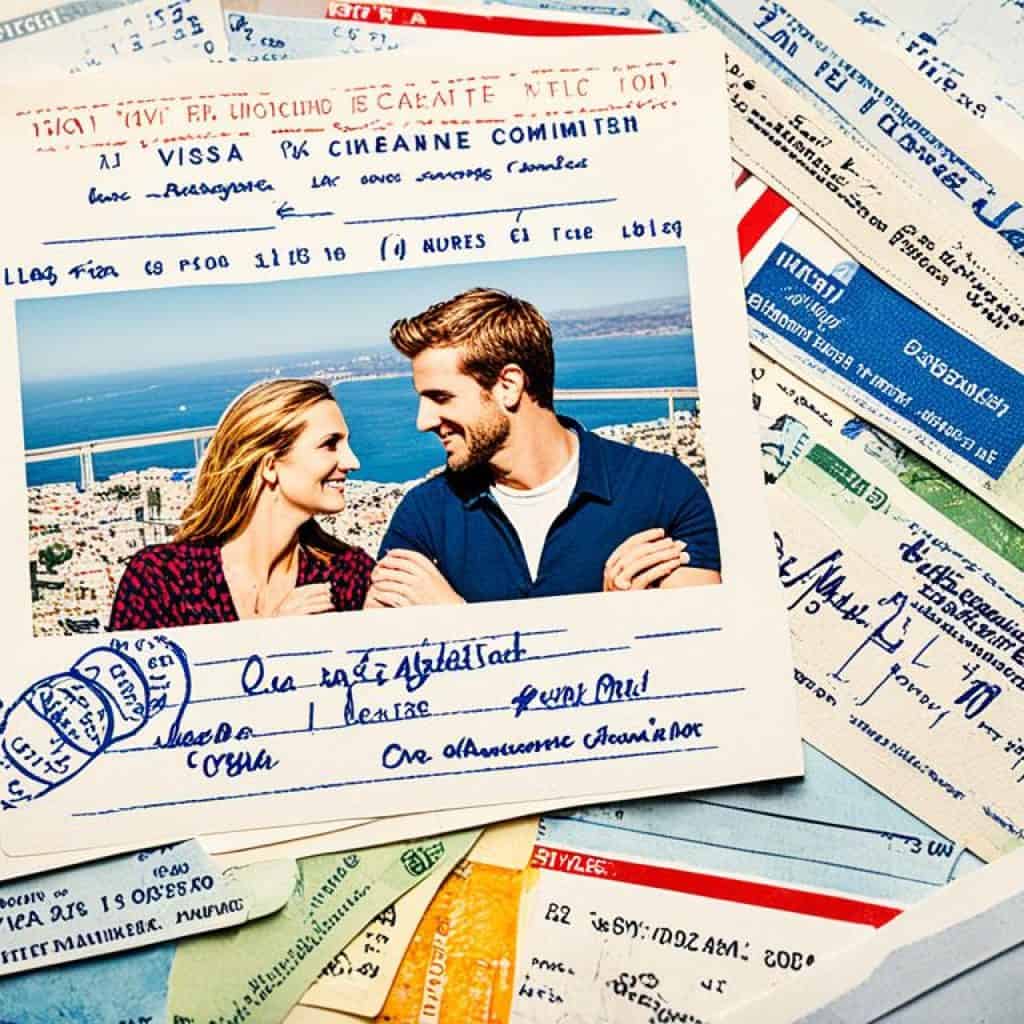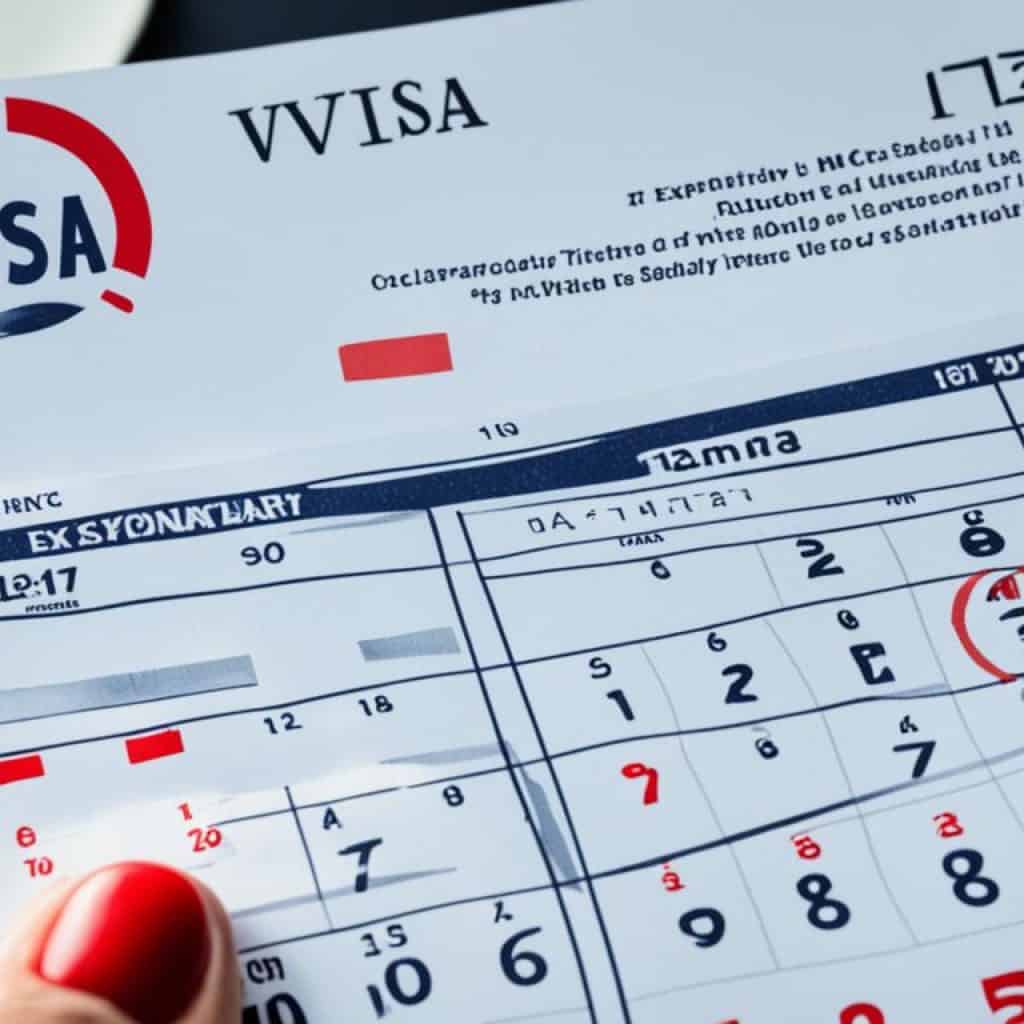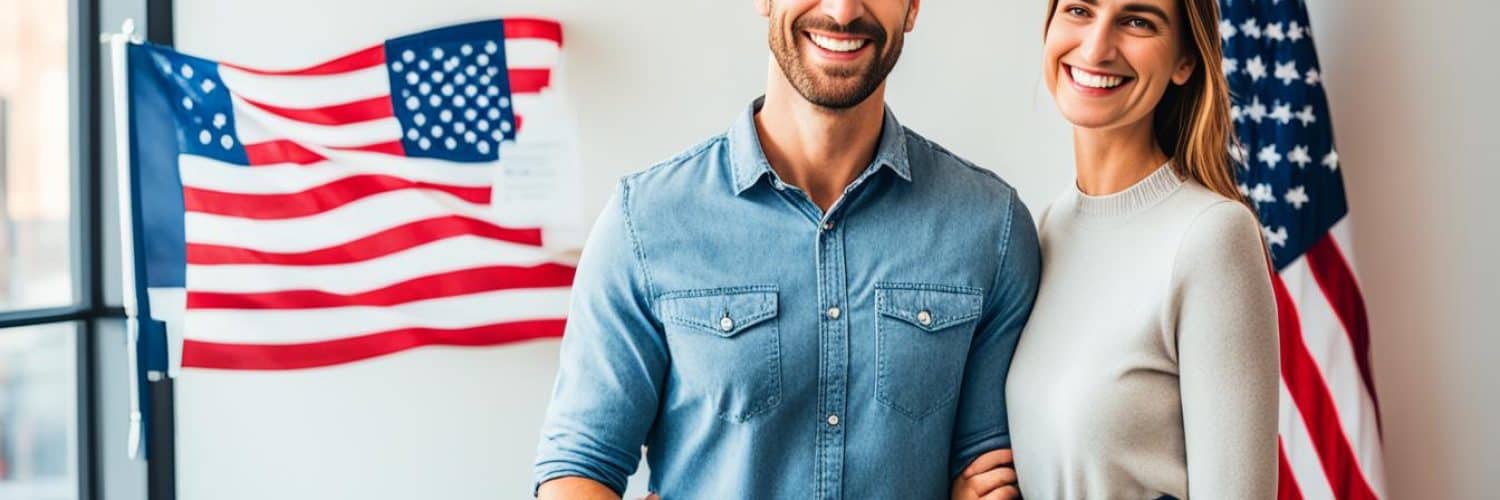Are you dreaming of being united with your loved one in the United States? The fiancé visa, also known as the K1 visa, can help make your dream a reality. But what are the requirements to obtain this visa? Let’s explore the fiancé visa USA requirements and discover how you can navigate the process.
Key Takeaways:
- Being engaged to a U.S. citizen is a requirement for the fiancé visa.
- Intending to marry your fiancé(e) within 90 days of entering the United States is a crucial requirement.
- Meeting your fiancé(e) in person at least once in the last 2 years is necessary for the visa application.
- Proving the authenticity of your relationship and providing the necessary documentation is essential.
- The processing time for a K1 visa application is generally around 4 to 6 months.
Who is considered a âfiancé(e)â under U.S. law?
Under U.S. law, a “fiancé(e)” is defined as the foreign national applying for a visa for the purpose of entering the U.S. to marry his or her U.S. citizen partner. It is important to demonstrate that the commitment is genuine and not solely for the purpose of obtaining immigration benefits. Any previous marriages must have been legally dissolved by divorce, annulment, or death.
Who can apply for a K1 visa for your fiancé(e)?
To apply for a K1 visa for your fiancé(e) to enter the United States, there are specific requirements that need to be met. These requirements ensure that the relationship is genuine and that both parties intend to marry within 90 days of entering the country. Here are the key requirements for a US fiancé visa:
- Being a U.S. citizen: You must be a U.S. citizen in order to petition for a fiancé visa.
- Legally able to marry: Both you and your fiancé(e) must be legally eligible to marry under U.S. law.
- Intent to marry within 90 days: You and your fiancé(e) must have the intention to marry within 90 days of your fiancé(e) entering the United States on the K1 visa.
- One in-person meeting: You and your fiancé(e) must have met in person at least once within the last 2 years. However, there are exceptions to this requirement if it goes against cultural customs or presents an extremely difficult situation for the U.S. citizen petitioner.
- Previous marriages dissolved: If either you or your fiancé(e) were previously married, those marriages must have been legally dissolved through divorce, annulment, or death.
Meeting these requirements is crucial for a successful fiancé visa application. It is important to gather all the necessary documentation and evidence to support your case and prove the authenticity of your relationship. Working with an experienced immigration attorney can help ensure a smooth and successful application process.
What documentation do I need for the K1 visa interview?
When preparing for your K1 visa interview, it is crucial to gather all the necessary documentation to support your application. By providing the required paperwork in a timely manner, you can avoid complications and ensure a smooth interview process. Here is a list of the essential fiancé visa documentation you will need:
- Form I-129F (Petition for Alien Fiancé(e)): This form serves as the initial petition to establish the relationship between the U.S. citizen petitioner and the foreign fiancé(e).
- Form DS-160: This is the nonimmigrant visa application form that must be completed prior to your interview.
- Form I-601 (Application for Waiver of Grounds of Inadmissibility): If you have any grounds of inadmissibility, such as previous criminal convictions, this form should be submitted.
- A valid passport: You need to provide a copy of your valid passport, which should not expire within the next six months.
- Divorce or death certificates: If either you or your fiancé(e) were previously married, provide official divorce or death certificates to prove the dissolution of previous marriages.
- Two recent photographs: Submit two identical passport-sized photographs of yourself and your fiancé(e) taken within the last six months.
- Criminal record certificate: This certificate is required to prove that you have no criminal record or have not been involved in any criminal activities.
- Proof of payment of fees: Include documentation of the payment of any applicable fees, such as the visa application fee and the medical examination fee.
By ensuring you have all the necessary documentation, you can present a comprehensive and well-prepared case during your K1 visa interview. Remember to organize your paperwork neatly and make clear, legible copies of all the required documents.
What documents can serve as evidence of relationship?
Proving the authenticity of your relationship is a crucial step in the fiancé visa application process. Providing a strong evidence package can help demonstrate the legitimacy of your relationship and increase the chances of a successful application. Here are some documents that can serve as compelling evidence:
- Photographs: Submitting photographs of you and your fiancé(e) together can showcase the genuine bond you share. Include pictures from different occasions and locations to highlight the depth of your relationship.
- Correspondence: Emails, letters, and messages exchanged between you and your fiancé(e) can serve as proof of ongoing communication and emotional support.
- Call logs: Providing call logs or phone bills that demonstrate regular communication can further strengthen your case.
- Proof of personal visits: Include copies of airline tickets, hotel reservations, and travel itineraries from your visits to see each other. These documents validate the physical meetings and the commitment to your relationship.
- Witness affidavits: Sworn statements from friends, family members, or other individuals who can testify to the authenticity of your relationship can be influential evidence.
- Shared financial records: Joint bank accounts, shared leases or property ownership, or any legal documentation that demonstrates financial cooperation can bolster your case.
- Commitment documents: Any commitment announcements, engagement party invitations, or ceremony records can help establish the seriousness and intent of your relationship.
Gathering a comprehensive evidence package is essential for a strong fiancé visa application. Remember to include a variety of documents to paint a complete picture of your relationship. By providing compelling evidence, you increase your chances of a successful fiancé visa approval.

How much does the fiancé visa cost?
Applying for a fiancé visa involves various costs that you should take into account when planning your immigration journey. Understanding the fiancé visa cost will help you prepare financially for the application process. Let’s break down the expenses involved in obtaining a fiancé visa to the United States.
Government Fees
The government fees associated with the fiancé visa application can amount to approximately $800. These fees cover the processing and administrative costs of your visa application. It is important to note that these fees are subject to change, so it’s advisable to check the most up-to-date information on the official U.S. government websites.
Form DS-160 Filing Fee
When applying for a fiancé visa, you will need to fill out Form DS-160, which is the Nonimmigrant Visa Application. This form requires payment of a filing fee, which is currently around $160 per applicant. This fee covers the processing and review of your visa application.
Nonimmigrant Visa Application Fee (MRV)
Another fee that you should consider is the Nonimmigrant Visa Application Fee, also known as the Machine Readable Visa fee (MRV). This fee is approximately $265 per applicant and covers the visa application processing services provided by the U.S. Department of State.
Form I-129F Petition Fee
As part of the fiancé visa application process, the U.S. citizen petitioner is required to file Form I-129F, the Petition for Alien Fiancé(e). This form has a petition fee, which should be paid by the petitioner. The current fee for Form I-129F is subject to change, so it’s important to refer to the official USCIS website for the most up-to-date information.
Medical Examination Fees
Prior to the issuance of a fiancé visa, the beneficiary of the visa is required to undergo a medical examination by a designated panel physician. The cost of this examination varies by location and can range from around $100 to $500 or more. It is crucial to contact the approved panel physicians in your area to inquire about their fees and schedule the required medical examination.
It’s important to note that these costs are based on current information and are subject to change. Additionally, fee waivers may be available in certain cases, such as financial hardship. Consulting with an experienced immigration attorney will help you understand the fees applicable to your specific situation and explore any available waivers.
By budgeting for the fiancé visa cost, you can ensure that you are prepared financially to navigate the application process and pursue your dream of being together with your loved one in the United States.
What happens if I enter the U.S. on a K1 visa and miss the 90-day marriage deadline?
It is crucial to understand the consequences of missing the 90-day marriage deadline after entering the U.S. on a K1 visa. Failure to comply with this requirement can have significant ramifications, including the risk of deportation and loss of immigration status.
If you find yourself in a situation where the 90-day deadline is approaching or has already passed, it is essential to take prompt action. One option is to initiate a status adjustment process to rectify your immigration status. This process involves filing an application to adjust your status to that of a permanent resident.
However, it’s important to note that missing the deadline can complicate the status adjustment process and may require additional documentation and evidence to prove the authenticity of your relationship. Seeking legal assistance from an experienced immigration attorney is highly recommended in these situations to navigate the complex process and understand the available options.
Consequences of Missing the 90-Day Marriage Deadline:
- Risk of Deportation: If you fail to marry your U.S. citizen fiancé(e) within the specified 90-day period, you may be at risk of deportation. It’s crucial to take this deadline seriously and make every effort to fulfill the requirement on time.
- Loss of Immigration Status: Missing the deadline can result in the loss of your immigration status as a K1 visa holder. This can have serious consequences for your ability to reside and work in the United States legally.
- Complicated Status Adjustment Process: If you marry your fiancé(e) after the 90-day period, you will typically need to go through a status adjustment process to become a permanent resident. This process may be more complex and require additional evidence to prove the authenticity of your relationship.
The consequences of missing the 90-day marriage deadline highlight the importance of careful planning and adherence to the requirements of the K1 visa. It is crucial to communicate and collaborate with your fiancé(e), immigration attorney, and any other relevant parties to ensure a successful and timely marriage within the designated period.
| Consequences | Description |
|---|---|
| Risk of Deportation | Failing to marry within the 90-day period puts you at risk of deportation from the U.S. |
| Loss of Immigration Status | Missing the deadline can lead to the loss of your K1 visa immigration status. |
| Complicated Status Adjustment Process | Marrying after the 90-day period may require a more complex status adjustment process to become a permanent resident. |
Can the duration of a K1 visa be extended?
Unfortunately, the duration of a K1 visa cannot be extended. Once you enter the country on a K1 visa, you are granted a maximum of 90 days to get married to your fiancé(e). It is important to note that staying longer than the allowed period is a violation of immigration laws and can result in serious consequences, including deportation.
If you find yourself in a situation where you need to stay longer in the United States, there is a solution. You would need to go through a status adjustment process to change your visa status. This involves applying for a different type of visa, such as a spousal visa, which would allow you to remain in the country legally and continue your journey towards citizenship.
The status adjustment process can be complex, so it is highly recommended to seek guidance from an experienced immigration attorney who can help you navigate the requirements and procedures. They will ensure that you have the best chance of a successful adjustment and assist you in achieving your goal of extending your stay in the United States.

How long does it take to process a K1 visa application?
The processing time for a K1 visa application can vary depending on individual circumstances and additional proof required by the U.S. Citizenship and Immigration Services (USCIS). While the general timeline is around 4 to 6 months, it’s essential to be prepared for the possibility of longer processing times. It is advisable to stay in touch with your immigration attorney for regular updates and guidance throughout the application process.
As of September 2021, USCIS is experiencing delays due to the ongoing COVID-19 pandemic and increased processing backlogs. These delays can extend the processing time for K1 visa applications beyond the typical timeframe.
The USCIS reviews each application thoroughly to ensure compliance with the fiancé visa requirements. Any additional investigation or request for evidence may further prolong the processing time. To avoid unnecessary delays, provide all necessary documentation accurately and promptly respond to any requests from USCIS.
Factors that can impact the processing time:
- USCIS workload and backlog
- Completeness and accuracy of the application
- Additional review or investigation
- Availability of interview slots at the U.S. embassy or consulate
- Certain national security issues or administrative processing requirements
“Patience and open communication with your immigration attorney can help navigate any potential delays and ensure a smooth K1 visa application process.”
Tracking the status of your application:
USCIS provides online tools such as the Case Status Online portal where you can track the progress of your K1 visa application. It allows you to check the current processing stage and estimated completion time. Additionally, USCIS may send notifications and requests for further information via mail or email, so it’s crucial to provide accurate contact information and promptly respond to any communication.
| Processing Time Frame | Approximate Duration |
|---|---|
| Shortest Processing Time | 4 months |
| Average Processing Time | 4 to 6 months |
| Longest Processing Time | Varies depending on the case and USCIS workload |
Can the K1 visa be denied?
Yes, the K1 visa can be denied if the applicant does not meet the requirements or if there is a criminal history that includes serious crimes. USCIS carefully reviews each application and may deny it if they find any grounds for inadmissibility.
It is important to work with an experienced immigration attorney to ensure that your application is prepared correctly to avoid any potential denials. They will guide you through the process, help you gather the necessary documentation, and advise you on how to present a strong case to USCIS.
Common reasons for K1 visa denial:
- Lack of evidence of a genuine relationship: USCIS requires proof that the relationship is bona fide and not solely for immigration purposes. Without sufficient documentation and evidence, your application may be denied.
- Ineligibility to marry: If you or your fiancé(e) are not legally able to marry under U.S. law, your visa may be denied.
- Criminal history: A criminal record, especially for serious offenses, can be a significant factor in visa denial. USCIS assesses whether the applicant poses a security risk to the country.
- Immigration violations or fraud: If you have previously violated U.S. immigration laws or have been involved in any fraudulent activities, your application may be denied.
- Failure to provide required documents: Missing or incomplete documentation can lead to visa denial. It is crucial to carefully follow the instructions provided by USCIS and submit all the necessary paperwork.
Remember, a K1 visa denial is not the end of the road. You may have the option to file an appeal or reapply after addressing the issues that led to the denial. Consulting with an immigration attorney will help you navigate through the process and increase your chances of a successful outcome.
Reasons for K1 Visa Denial
| Reasons | Description |
|---|---|
| Lack of evidence of a genuine relationship | Insufficient documentation or proof that the relationship is not genuine |
| Ineligibility to marry | Not meeting the legal requirements to marry under U.S. law |
| Criminal history | Presence of a criminal record, especially for serious offenses |
| Immigration violations or fraud | Previous violations of U.S. immigration laws or involvement in fraudulent activities |
| Failure to provide required documents | Missing or incomplete documentation required for the visa application |
Romantic Bridge Visa Procedure
Planning to bring your romantic partner to the United States? The Romantic Bridge Visa Procedure is the key to starting your beautiful love story together in the land of dreams. This visa process is designed for those in committed relationships who wish to be reunited and build a life together in the U.S.
Whether you’re engaged or planning to tie the knot, the Romantic Bridge Visa Procedure offers a pathway for love to bloom across borders. Let’s explore the steps involved in this heartwarming journey:
Gathering Required Documents
Start by collecting all the necessary documents for your Romantic Bridge Visa application. These may include but are not limited to:
- Valid passports for both partners
- Proof of your romantic relationship, such as photographs, love letters, and messages
- Legal documentation supporting your commitment, such as engagement rings and wedding invitations
- Financial evidence to demonstrate your ability to support each other
It’s essential to provide clear and compelling evidence of your genuine love and commitment, painting a vivid picture of your relationship that convinces immigrations officials of your bond.
Completing the Application
Once you have gathered all the necessary documents, it’s time to complete the Romantic Bridge Visa application. This process typically involves:
- Filling out the application form accurately and truthfully
- Submitting the required documents as per the guidelines
- Paying the application fee
Double-check all the information before submitting the application to avoid delays or potential issues.
Attending the Visa Interview
After submitting your application, you may be called in for an interview at the U.S. embassy or consulate in your home country. This interview allows immigration officers to assess the authenticity of your relationship and further evaluate your eligibility for the Romantic Bridge Visa.
Be prepared to share details about your love story, future plans, and how you envision building a life together in the United States. Answer all questions honestly and confidently to demonstrate the sincerity of your relationship.
Receiving the Romantic Bridge Visa
Once your application is approved, you will receive the Romantic Bridge Visa, granting your partner entry into the United States. Make sure to carefully review the visa details for any restrictions or conditions.
With the Romantic Bridge Visa in hand, you and your partner can finally be together and embark on a new chapter of your love story. Whether you choose to have a romantic wedding surrounded by friends and family or an intimate ceremony for two, this visa provides an opportunity to build a future filled with love and happiness.

| Benefits of the Romantic Bridge Visa | Requirements for the Romantic Bridge Visa |
|---|---|
|
|
Fiancé Visa Timeline and Process
Applying for a fiancé visa involves a step-by-step process that follows a specific timeline. Here is an overview of the key stages and estimated timeframes:
Filing the Petition (I-129F)
- Complete and submit Form I-129F, Petition for Alien Fiancé(e), to USCIS.
- Include all required documentation, such as proof of U.S. citizenship, evidence of meeting in person, and supporting relationship documents.
- Expect a processing time of approximately 6 to 9 months for USCIS to approve the petition.
Consular Processing
- After USCIS approves the petition, it is forwarded to the U.S. Embassy or Consulate in the foreign fiancé(e)’s country.
- The embassy or consulate will provide instructions for scheduling a visa interview.
- The scheduling process and availability of interview slots may vary depending on the location.
- Prepare all necessary documentation for the interview, including medical examination results.
- Attend the visa interview and answer questions regarding your relationship.
- If approved, the visa will be issued and the foreign fiancé(e) can travel to the U.S.
Entering the U.S. and Marriage
- Upon arrival in the U.S., the foreign fiancé(e) must marry the U.S. citizen petitioner within 90 days.
- It is important to gather all the necessary documents for the marriage, such as marriage licenses and certificates.
Adjustment of Status
- If the foreign fiancé(e) wants to remain in the U.S. after getting married, they must apply for Adjustment of Status (Form I-485) to obtain a Green Card.
- The processing time for the Adjustment of Status application can vary, but generally takes several months.
Citizenship Application
- After obtaining a Green Card, the foreign spouse can apply for U.S. citizenship after meeting the necessary residency requirements.
- Consult with an immigration attorney to understand the timeline and process for naturalization.
Keep in mind that the timeline provided is approximate and subject to change based on individual circumstances, government processing times, and any potential delays or requests for additional evidence. It is recommended to consult with an experienced immigration attorney to navigate the fiancé visa process smoothly.
| Stage | Estimated Timeframe |
|---|---|
| Filing the Petition | 6-9 months |
| Consular Processing | Varies by location |
| Entering the U.S. and Marriage | Within 90 days of arrival |
| Adjustment of Status | Several months |
| Citizenship Application | Varies based on residency requirements |
As each step of the fiancé visa process has its own specific requirements and timeframes, it is important to stay organized, timely, and well-prepared to ensure a successful and smooth transition for you and your fiancé(e).
Fiancé Visa Vs Spouse Visa
When it comes to bringing your loved one to the United States, there are different pathways available, including the fiancé visa and the spouse visa. Both options offer the opportunity to reunite with your partner, but they have distinct differences to consider.
If you are engaged to a U.S. citizen and plan to marry within 90 days of entering the country, the fiancé visa may be the right choice for you. This visa allows you to enter the United States with the intention of getting married and then adjusting your status to become a permanent resident. It requires meeting certain eligibility criteria, such as proving your genuine relationship and complying with the necessary documentation requirements.
On the other hand, if you are already married to a U.S. citizen, the spouse visa, also known as the marriage-based visa, may be the better option. With this visa, you can enter the United States as the spouse of a U.S. citizen and apply for permanent residency immediately. The spouse visa requires providing evidence of a valid and legally recognized marriage, as well as meeting other requirements established by U.S. immigration laws.
To understand the differences between the fiancé visa and the spouse visa, let’s take a closer look at some key factors:
| Fiancé Visa | Spouse Visa | |
|---|---|---|
| Eligibility | Engaged to a U.S. citizen | Married to a U.S. citizen |
| Application Process | File a petition (Form I-129F) and go through consular processing | File an immigrant visa petition (Form I-130) and go through consular processing |
| Timeline | Average processing time of 4 to 6 months | Average processing time of 10 to 14 months |
| Entry with Intent to Marry | Allowed | Not required, as marriage has already taken place |
| Adjustment of Status | Required after marriage | Not required, as the spouse visa leads to immediate permanent residency |
It’s essential to consider your specific circumstances and choose the visa that aligns with your relationship status and timeline. Consulting with an experienced immigration attorney can provide invaluable guidance throughout the process and ensure you make the right decision accordingly.
Fiancé Visa Medical Exam
Before your fiancé can obtain a K1 visa and join you in the United States, they are required to undergo a medical examination. The purpose of this exam is to ensure that your fiancé is in good health and does not pose a threat to public health and safety.
The fiancé visa medical exam is conducted by a specially designated panel physician approved by the U.S. Department of State. The exam includes a comprehensive assessment of your fiancé’s physical and mental health.
During the medical exam, your fiancé will undergo a series of tests and screenings, which may include:
- A physical examination to assess general health and identify any underlying medical conditions
- Immunizations to ensure your fiancé is up to date with the required vaccinations
- Tuberculosis (TB) screening, which may include a chest X-ray or other diagnostic tests
- Tests for sexually transmitted diseases (STDs) and other communicable diseases
- A review of medical records and documentation of any past or current medical conditions
It is important to note that the medical examination must be conducted by a panel physician approved by the U.S. Embassy or Consulate in the country where the exam is performed. It is crucial to follow the guidelines provided by the embassy or consulate and to schedule the medical exam well in advance to ensure timely completion of the visa application process.
Once the medical exam is completed, the panel physician will provide a sealed envelope containing the medical report and relevant documentation. This envelope must remain sealed and should only be submitted to the U.S. Embassy or Consulate along with the visa application.
Remember that the medical examination is an essential part of the fiancé visa application process. It is important to carefully follow the instructions provided by the embassy or consulate and ensure that your fiancé attends the exam appointment as scheduled. Failure to complete the medical examination may result in delays or denial of the visa application.
Fiancé Visa Medical Exam Process
| Step | Description |
|---|---|
| 1 | Schedule a medical examination appointment with an approved panel physician |
| 2 | Bring all required documentation, including passport, visa interview appointment letter, and any medical records or test results |
| 3 | Undergo a physical examination, including tests for communicable diseases and vaccinations |
| 4 | Ensure that the panel physician completes and seals the medical examination report in an envelope |
| 5 | Submit the sealed envelope containing the medical report to the U.S. Embassy or Consulate |
Once the medical examination is successfully completed and the sealed envelope is submitted to the U.S. Embassy or Consulate, your fiancé will be one step closer to obtaining the K1 visa and joining you in the United States.
Fiancé Visa Interview Questions
Preparing for the fiancé visa interview is crucial to ensure a successful outcome. The interview is an opportunity for the U.S. embassy or consulate to assess the authenticity of your relationship and your eligibility for the K1 visa. While the specific questions asked may vary depending on the interviewing officer, it’s helpful to familiarize yourself with common fiancé visa interview questions to better prepare.
Sample Fiancé Visa Interview Questions:
- How and when did you and your fiancé(e) meet?
- Describe your engagement and how it happened.
- What are your fiancé(e)’s personal and professional backgrounds?
- Have you and your fiancé(e) met each other’s families?
- Can you provide any evidence of your relationship? (photos, emails, letters, etc.)
- What are your wedding plans?
- How do you plan to support yourselves financially in the United States?
- Have you and your fiancé(e) discussed living arrangements in the U.S.?
- Do you have any previous criminal convictions?
- What are your long-term plans as a married couple?
These questions serve as a starting point for the interview, and the officer may ask follow-up questions to gain a deeper understanding of your relationship. It’s important to answer truthfully and confidently, providing any requested documentation to support your answers. Remember to dress appropriately and arrive on time for your interview to make a positive impression.
Preparing thorough and honest responses to potential interview questions will help demonstrate the authenticity of your relationship and increase your chances of a successful fiancé visa interview.
Now that you have a better understanding of the possible questions you may encounter during the fiancé visa interview, take the time to thoroughly prepare your answers and gather any additional evidence that may support your case. By doing so, you will be well-equipped to navigate the interview process and increase your chances of receiving the K1 visa.
Conclusion
In conclusion, understanding and fulfilling the fiancé visa USA requirements are crucial steps towards achieving your dream of being united with your loved one in the United States. The K1 visa has specific eligibility criteria and documentation requirements that need to be met. It is essential to provide evidence that proves the authenticity of your relationship and to submit all the necessary documents on time.
The application process for a fiancé visa can take several months, so it is important to stay in close communication with your immigration attorney throughout the process. They can guide you through the application, help you navigate any potential hurdles, and ensure that your application is prepared correctly. By adhering to the requirements and seeking professional advice, you can increase your chances of a smooth and successful application.
Remember, the journey towards being united with your fiancé(e) in the U.S. may seem daunting, but with the right knowledge, preparation, and support, it is an achievable goal. By understanding the fiancé visa USA requirements and following the proper procedures, you can take a significant step towards building your future together in the United States.
FAQ
Who is considered a âfiancé(e)â under U.S. law?
Under U.S. law, a “fiancé(e)” is defined as the foreign national applying for a visa for the purpose of entering the U.S. to marry his or her U.S. citizen partner.
Who can apply for a K1 visa for your fiancé(e)?
You can apply for a K1 visa for your fiancé(e) if you are a U.S. citizen, legally able to marry, intend to marry your fiancé(e) within 90 days of entering the United States, and have met your fiancé(e) in person at least once in the last 2 years.
What documentation do I need for the K1 visa interview?
The documentation required for a K1 visa interview includes Form I-129F (Petition for Alien Fiancé(e)), Form DS-160, Form I-601 (Application for Waiver of Grounds of Inadmissibility), a valid passport, divorce or death certificates from previous marriages, two recent photographs, a criminal record certificate, and proof of payment of fees.
What documents can serve as evidence of relationship?
To prove the authenticity of your relationship, you can submit various documents as evidence. These include photographs of you and your fiancé(e) together, correspondence such as emails and letters, call logs showing constant communication, proof of personal visits such as airline tickets and hotel reservations, witness affidavits from friends and family members, shared financial records, and commitment documents such as commitment announcements or ceremony records.
How much does the fiancé visa cost?
The cost of a fiancé visa includes government fees, Form DS-160 filing fee, Nonimmigrant Visa Application Fee (MRV), Form I-129F Petition Fee, and medical examination fees. The government fees can be around $800, the Form DS-160 filing fee is approximately $160 per applicant, and the Nonimmigrant Visa Application Fee is around $265 per applicant.
What happens if I enter the U.S. on a K1 visa and miss the 90-day marriage deadline?
If you miss the 90-day marriage deadline, there may be consequences such as the risk of deportation and loss of immigration status. It is important to seek legal assistance in such situations to understand your options and take the necessary steps.
Can the duration of a K1 visa be extended?
No, the duration of a K1 visa cannot be extended. It automatically expires after 90 days from entry into the country. Staying longer than the allowed period violates immigration laws and may result in deportation.
How long does it take to process a K1 visa application?
The processing time for a K1 visa application is generally around 4 to 6 months. However, this timeline can vary depending on individual circumstances and any additional proof required by USCIS. It is important to be prepared for the possibility of longer processing times and to stay in touch with your immigration attorney for updates.








Add comment